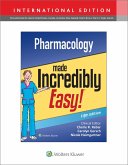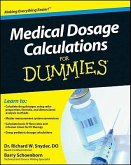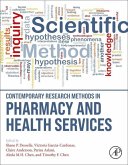Robert M. Veatch (Professor of Medical Ethics Emeritus and Senior R, Amy Haddad (Center for Health Policy Director and Ethics and Dr. C, E. J. Last (Indiana University Medical Safety Clinical Pharmacist
Case Studies in Pharmacy Ethics
Third Edition
Robert M. Veatch (Professor of Medical Ethics Emeritus and Senior R, Amy Haddad (Center for Health Policy Director and Ethics and Dr. C, E. J. Last (Indiana University Medical Safety Clinical Pharmacist
Case Studies in Pharmacy Ethics
Third Edition
- Broschiertes Buch
- Merkliste
- Auf die Merkliste
- Bewerten Bewerten
- Teilen
- Produkt teilen
- Produkterinnerung
- Produkterinnerung
Case Studies in Pharmacy Ethics explores the range of ethics situations faced by pharmacists in daily practice, from direct patient care to broad systemic issues. Using cases and commentaries, the book provides tools to assist pharmacists in understanding and resolving ethical issues.
Andere Kunden interessierten sich auch für
![Psychopharmacology Psychopharmacology]() Herbert MwebePsychopharmacology39,99 €
Herbert MwebePsychopharmacology39,99 €![Pharmacology Made Incredibly Easy Pharmacology Made Incredibly Easy]() Lippincott Williams & WilkinsPharmacology Made Incredibly Easy41,99 €
Lippincott Williams & WilkinsPharmacology Made Incredibly Easy41,99 €![Medical Dosage Calculations for Dummies Medical Dosage Calculations for Dummies]() Richard SnyderMedical Dosage Calculations for Dummies29,99 €
Richard SnyderMedical Dosage Calculations for Dummies29,99 €![Pharmacy Education in the Twenty First Century and Beyond Pharmacy Education in the Twenty First Century and Beyond]() Pharmacy Education in the Twenty First Century and Beyond87,99 €
Pharmacy Education in the Twenty First Century and Beyond87,99 €![Introducing Pharmacology Introducing Pharmacology]() Roger McFadden (UK Birmingham City University)Introducing Pharmacology56,99 €
Roger McFadden (UK Birmingham City University)Introducing Pharmacology56,99 €![Prescribing Mental Health Medication Prescribing Mental Health Medication]() Christopher Doran MD (US University of Colorado School of MedicinePrescribing Mental Health Medication76,99 €
Christopher Doran MD (US University of Colorado School of MedicinePrescribing Mental Health Medication76,99 €![Contemporary Research Methods in Pharmacy and Health Services Contemporary Research Methods in Pharmacy and Health Services]() Contemporary Research Methods in Pharmacy and Health Services119,99 €
Contemporary Research Methods in Pharmacy and Health Services119,99 €-
-
-
Case Studies in Pharmacy Ethics explores the range of ethics situations faced by pharmacists in daily practice, from direct patient care to broad systemic issues. Using cases and commentaries, the book provides tools to assist pharmacists in understanding and resolving ethical issues.
Hinweis: Dieser Artikel kann nur an eine deutsche Lieferadresse ausgeliefert werden.
Hinweis: Dieser Artikel kann nur an eine deutsche Lieferadresse ausgeliefert werden.
Produktdetails
- Produktdetails
- Verlag: Oxford University Press Inc
- 3 Revised edition
- Seitenzahl: 384
- Erscheinungstermin: 17. Juli 2017
- Englisch
- Abmessung: 231mm x 152mm x 23mm
- Gewicht: 548g
- ISBN-13: 9780190277000
- ISBN-10: 0190277009
- Artikelnr.: 47864244
- Herstellerkennzeichnung
- Libri GmbH
- Europaallee 1
- 36244 Bad Hersfeld
- gpsr@libri.de
- Verlag: Oxford University Press Inc
- 3 Revised edition
- Seitenzahl: 384
- Erscheinungstermin: 17. Juli 2017
- Englisch
- Abmessung: 231mm x 152mm x 23mm
- Gewicht: 548g
- ISBN-13: 9780190277000
- ISBN-10: 0190277009
- Artikelnr.: 47864244
- Herstellerkennzeichnung
- Libri GmbH
- Europaallee 1
- 36244 Bad Hersfeld
- gpsr@libri.de
Robert Veatch graduated from the Purdue University School of Pharmacy and has been at the Kennedy Institute of Ethics at Georgetown since 1979 serving as Director before returning to the faculty. He is the author or editor of over 60 books including a series of case study books covering the various health professions. Amy Haddad is Professor in the Department of Pharmacy Sciences in the School of Pharmacy and Health Professions at Creighton University. E. J. Last received her B.S. studying the neurosciences from the University of Chicago, her D.Pharm from Midwestern University Chicago College of Pharmacy, and her J.D. from Indiana University.
* Introduction: Four Questions of Ethics
* What Are the Source, Meaning, and Justification of Ethical Claims?
* 1. Distinguish Between Evaluative Statements and Statements
Presenting Nonevaluative Facts
* 2. Distinguish Between Moral and Nonmoral Evaluations
* 3. Determine Who Ought to Decide
* What Kinds of Acts Are Right?
* Consequentialism
* Deontological or "Duty-Based" Ethics
* Other Issues of Normative Ethics
* How Do Rules Apply to Specific Situations?
* What Ought to Be Done in Specific Cases?
* Notes
* PART I: Ethics and Values in Pharmacy
* Chapter 1: A Model for Ethical Problem Solving
* The Five-Step Model
* Application of the Model
* 1. Respond to the Sense That Something Is Wrong
* 2. Gather Information
* 3. Identify the Ethical Problem/Moral Diagnosis
* 4. Seek a Resolution
* 5. Work with Others to Choose a Course of Action
* Notes
* Chapter 2: Values in Health and Illness
* Identifying Value Judgments in Pharmacy
* Separating Ethical and Other Evaluations
* Chapter 3: What Is the Source of Moral Judgments?
* Grounding Ethics in the Professional Code
* Grounding Ethics in the Prescriber's Orders
* Grounding Ethics in Hospital Policy
* Grounding Ethics in the Patient's Values
* Grounding Ethics in Religious or Philosophical Perspectives
* Notes
* PART II: Ethical Principles in Pharmacy Ethics
* Chapter 4: Benefiting the Patient and Others: The Duty to Do Good and
Avoid Harm
* Benefiting the Patient
* Health in Conflict with Other Goods
* Relating Benefits and Harms
* Benefits of Rules and Benefits in Specific Cases
* Benefiting Society and Individuals Who Are Not Patients
* Benefits to Society
* Benefits to Specific Nonpatients
* Benefit to the Profession
* Benefit to the Pharmacist and the Pharmacist's Family
* Notes
* Chapter 5: Justice: The Allocation of Health Resources
* Justice Among Patients
* Justice Between Patients and Others
* Justice in Public Policy
* Justice and Other Ethical Principles
* Notes
* Chapter 6: Autonomy
* Determining Whether a Patient Is Autonomous
* External Constraints on Autonomy
* Overriding the Choices of Autonomous Persons
* Notes
* Chapter 7: Veracity: Dealing Honestly with Patients
* The Condition of Doubt
* Lying in Order to Benefit
* Protecting the Patient by Lying
* Protecting the Welfare of Others
* Special Cases of Truth Telling
* Patients Who Don't Want to Be Told
* Family Members Who Insist the Patient Not Be Told
* The Right of Access to Medical Records
* Notes
* Chapter 8: Fidelity: Promise-Keeping and Confidentiality
* The Ethics of Promises: Explicit and Implicit
* The Limits on the Promise of Confidentiality
* Breaking Confidence to Benefit the Patient
* Breaking Confidence to Benefit Others
* Incompetent, Impaired, and Dishonest Colleagues
* Notes
* Chapter 9: Avoidance of Killing
* Active Killing Versus Letting One Die
* Withholding Versus Withdrawing Treatment
* Direct Versus Indirect Killing
* Justifiable Omissions
* Voluntary and Involuntary Killing
* Killing as Punishment
* Notes
* Part III: Special Problem Areas
* Chapter 10: Abortion, Sterilization, and Contraception
* Abortion
* Abortion for Medical Problems of the Fetus
* Abortion Following Sexual Assault
* Abortion to Save the Life of the Pregnant Woman
* Abortion and the Mentally Incapacitated Woman
* Abortion for Socioeconomic Reasons
* Sterilization
* Contraception
* Notes
* Chapter 11: Genetics, Birth, and the Biological Revolution
* Genetic Counseling
* Genetic and Genomic Screening
* In Vitro Fertilization
* Surrogate Motherhood
* Gene Therapy
* Notes
* Chapter 12: Mental Health and Behavior Control
* The Concept of Mental Health
* Mental Illness and Autonomous Behavior
* Mental Illness and Third-Party Interests
* Other Behavior-Controlling Therapies
* Notes
* Chapter 13: Formularies and Drug Distribution Systems
* Formularies
* Eliminating Unproven Therapies
* Eliminating Proven but Marginally Beneficial Therapies
* Eliminating Proven but Cost-Ineffective Therapies
* Appeals to Override Formularies
* Physician Behavior with Drug Company Influence
* Drug Distribution Systems
* Mail-Order Pharmacies
* Drugs from Outside the US
* Notes
* Chapter 14: Health Insurance, Health System Planning, and Rationing
* Patient Autonomy and Mandated Insurance
* Morally Controversial Treatment Coverage
* Insurance Coverage for Expensive Drugs
* Marginally Beneficial, Expensive Medications
* Off-label Therapies
* Notes
* Chapter 15: Experimentation on Human Subjects
* Calculating Risks and Benefits
* Privacy and Confidentiality
* Equity in Research
* Conflicts of Interest in Research
* Informed Consent in Research
* Notes
* Chapter 16: Consent and the Right to Refuse Treatment
* The Elements of a Consent
* The Standards for Consent
* Comprehension and Voluntariness
* Notes
* Chapter 17: Death and Dying
* The Definition of Death
* Competent and Formerly Competent Patients
* Never-Competent Patients
* Limits Based on Interests of Others
* Notes
* Appendix: Codes of Ethics
* What Are the Source, Meaning, and Justification of Ethical Claims?
* 1. Distinguish Between Evaluative Statements and Statements
Presenting Nonevaluative Facts
* 2. Distinguish Between Moral and Nonmoral Evaluations
* 3. Determine Who Ought to Decide
* What Kinds of Acts Are Right?
* Consequentialism
* Deontological or "Duty-Based" Ethics
* Other Issues of Normative Ethics
* How Do Rules Apply to Specific Situations?
* What Ought to Be Done in Specific Cases?
* Notes
* PART I: Ethics and Values in Pharmacy
* Chapter 1: A Model for Ethical Problem Solving
* The Five-Step Model
* Application of the Model
* 1. Respond to the Sense That Something Is Wrong
* 2. Gather Information
* 3. Identify the Ethical Problem/Moral Diagnosis
* 4. Seek a Resolution
* 5. Work with Others to Choose a Course of Action
* Notes
* Chapter 2: Values in Health and Illness
* Identifying Value Judgments in Pharmacy
* Separating Ethical and Other Evaluations
* Chapter 3: What Is the Source of Moral Judgments?
* Grounding Ethics in the Professional Code
* Grounding Ethics in the Prescriber's Orders
* Grounding Ethics in Hospital Policy
* Grounding Ethics in the Patient's Values
* Grounding Ethics in Religious or Philosophical Perspectives
* Notes
* PART II: Ethical Principles in Pharmacy Ethics
* Chapter 4: Benefiting the Patient and Others: The Duty to Do Good and
Avoid Harm
* Benefiting the Patient
* Health in Conflict with Other Goods
* Relating Benefits and Harms
* Benefits of Rules and Benefits in Specific Cases
* Benefiting Society and Individuals Who Are Not Patients
* Benefits to Society
* Benefits to Specific Nonpatients
* Benefit to the Profession
* Benefit to the Pharmacist and the Pharmacist's Family
* Notes
* Chapter 5: Justice: The Allocation of Health Resources
* Justice Among Patients
* Justice Between Patients and Others
* Justice in Public Policy
* Justice and Other Ethical Principles
* Notes
* Chapter 6: Autonomy
* Determining Whether a Patient Is Autonomous
* External Constraints on Autonomy
* Overriding the Choices of Autonomous Persons
* Notes
* Chapter 7: Veracity: Dealing Honestly with Patients
* The Condition of Doubt
* Lying in Order to Benefit
* Protecting the Patient by Lying
* Protecting the Welfare of Others
* Special Cases of Truth Telling
* Patients Who Don't Want to Be Told
* Family Members Who Insist the Patient Not Be Told
* The Right of Access to Medical Records
* Notes
* Chapter 8: Fidelity: Promise-Keeping and Confidentiality
* The Ethics of Promises: Explicit and Implicit
* The Limits on the Promise of Confidentiality
* Breaking Confidence to Benefit the Patient
* Breaking Confidence to Benefit Others
* Incompetent, Impaired, and Dishonest Colleagues
* Notes
* Chapter 9: Avoidance of Killing
* Active Killing Versus Letting One Die
* Withholding Versus Withdrawing Treatment
* Direct Versus Indirect Killing
* Justifiable Omissions
* Voluntary and Involuntary Killing
* Killing as Punishment
* Notes
* Part III: Special Problem Areas
* Chapter 10: Abortion, Sterilization, and Contraception
* Abortion
* Abortion for Medical Problems of the Fetus
* Abortion Following Sexual Assault
* Abortion to Save the Life of the Pregnant Woman
* Abortion and the Mentally Incapacitated Woman
* Abortion for Socioeconomic Reasons
* Sterilization
* Contraception
* Notes
* Chapter 11: Genetics, Birth, and the Biological Revolution
* Genetic Counseling
* Genetic and Genomic Screening
* In Vitro Fertilization
* Surrogate Motherhood
* Gene Therapy
* Notes
* Chapter 12: Mental Health and Behavior Control
* The Concept of Mental Health
* Mental Illness and Autonomous Behavior
* Mental Illness and Third-Party Interests
* Other Behavior-Controlling Therapies
* Notes
* Chapter 13: Formularies and Drug Distribution Systems
* Formularies
* Eliminating Unproven Therapies
* Eliminating Proven but Marginally Beneficial Therapies
* Eliminating Proven but Cost-Ineffective Therapies
* Appeals to Override Formularies
* Physician Behavior with Drug Company Influence
* Drug Distribution Systems
* Mail-Order Pharmacies
* Drugs from Outside the US
* Notes
* Chapter 14: Health Insurance, Health System Planning, and Rationing
* Patient Autonomy and Mandated Insurance
* Morally Controversial Treatment Coverage
* Insurance Coverage for Expensive Drugs
* Marginally Beneficial, Expensive Medications
* Off-label Therapies
* Notes
* Chapter 15: Experimentation on Human Subjects
* Calculating Risks and Benefits
* Privacy and Confidentiality
* Equity in Research
* Conflicts of Interest in Research
* Informed Consent in Research
* Notes
* Chapter 16: Consent and the Right to Refuse Treatment
* The Elements of a Consent
* The Standards for Consent
* Comprehension and Voluntariness
* Notes
* Chapter 17: Death and Dying
* The Definition of Death
* Competent and Formerly Competent Patients
* Never-Competent Patients
* Limits Based on Interests of Others
* Notes
* Appendix: Codes of Ethics
* Introduction: Four Questions of Ethics
* What Are the Source, Meaning, and Justification of Ethical Claims?
* 1. Distinguish Between Evaluative Statements and Statements
Presenting Nonevaluative Facts
* 2. Distinguish Between Moral and Nonmoral Evaluations
* 3. Determine Who Ought to Decide
* What Kinds of Acts Are Right?
* Consequentialism
* Deontological or "Duty-Based" Ethics
* Other Issues of Normative Ethics
* How Do Rules Apply to Specific Situations?
* What Ought to Be Done in Specific Cases?
* Notes
* PART I: Ethics and Values in Pharmacy
* Chapter 1: A Model for Ethical Problem Solving
* The Five-Step Model
* Application of the Model
* 1. Respond to the Sense That Something Is Wrong
* 2. Gather Information
* 3. Identify the Ethical Problem/Moral Diagnosis
* 4. Seek a Resolution
* 5. Work with Others to Choose a Course of Action
* Notes
* Chapter 2: Values in Health and Illness
* Identifying Value Judgments in Pharmacy
* Separating Ethical and Other Evaluations
* Chapter 3: What Is the Source of Moral Judgments?
* Grounding Ethics in the Professional Code
* Grounding Ethics in the Prescriber's Orders
* Grounding Ethics in Hospital Policy
* Grounding Ethics in the Patient's Values
* Grounding Ethics in Religious or Philosophical Perspectives
* Notes
* PART II: Ethical Principles in Pharmacy Ethics
* Chapter 4: Benefiting the Patient and Others: The Duty to Do Good and
Avoid Harm
* Benefiting the Patient
* Health in Conflict with Other Goods
* Relating Benefits and Harms
* Benefits of Rules and Benefits in Specific Cases
* Benefiting Society and Individuals Who Are Not Patients
* Benefits to Society
* Benefits to Specific Nonpatients
* Benefit to the Profession
* Benefit to the Pharmacist and the Pharmacist's Family
* Notes
* Chapter 5: Justice: The Allocation of Health Resources
* Justice Among Patients
* Justice Between Patients and Others
* Justice in Public Policy
* Justice and Other Ethical Principles
* Notes
* Chapter 6: Autonomy
* Determining Whether a Patient Is Autonomous
* External Constraints on Autonomy
* Overriding the Choices of Autonomous Persons
* Notes
* Chapter 7: Veracity: Dealing Honestly with Patients
* The Condition of Doubt
* Lying in Order to Benefit
* Protecting the Patient by Lying
* Protecting the Welfare of Others
* Special Cases of Truth Telling
* Patients Who Don't Want to Be Told
* Family Members Who Insist the Patient Not Be Told
* The Right of Access to Medical Records
* Notes
* Chapter 8: Fidelity: Promise-Keeping and Confidentiality
* The Ethics of Promises: Explicit and Implicit
* The Limits on the Promise of Confidentiality
* Breaking Confidence to Benefit the Patient
* Breaking Confidence to Benefit Others
* Incompetent, Impaired, and Dishonest Colleagues
* Notes
* Chapter 9: Avoidance of Killing
* Active Killing Versus Letting One Die
* Withholding Versus Withdrawing Treatment
* Direct Versus Indirect Killing
* Justifiable Omissions
* Voluntary and Involuntary Killing
* Killing as Punishment
* Notes
* Part III: Special Problem Areas
* Chapter 10: Abortion, Sterilization, and Contraception
* Abortion
* Abortion for Medical Problems of the Fetus
* Abortion Following Sexual Assault
* Abortion to Save the Life of the Pregnant Woman
* Abortion and the Mentally Incapacitated Woman
* Abortion for Socioeconomic Reasons
* Sterilization
* Contraception
* Notes
* Chapter 11: Genetics, Birth, and the Biological Revolution
* Genetic Counseling
* Genetic and Genomic Screening
* In Vitro Fertilization
* Surrogate Motherhood
* Gene Therapy
* Notes
* Chapter 12: Mental Health and Behavior Control
* The Concept of Mental Health
* Mental Illness and Autonomous Behavior
* Mental Illness and Third-Party Interests
* Other Behavior-Controlling Therapies
* Notes
* Chapter 13: Formularies and Drug Distribution Systems
* Formularies
* Eliminating Unproven Therapies
* Eliminating Proven but Marginally Beneficial Therapies
* Eliminating Proven but Cost-Ineffective Therapies
* Appeals to Override Formularies
* Physician Behavior with Drug Company Influence
* Drug Distribution Systems
* Mail-Order Pharmacies
* Drugs from Outside the US
* Notes
* Chapter 14: Health Insurance, Health System Planning, and Rationing
* Patient Autonomy and Mandated Insurance
* Morally Controversial Treatment Coverage
* Insurance Coverage for Expensive Drugs
* Marginally Beneficial, Expensive Medications
* Off-label Therapies
* Notes
* Chapter 15: Experimentation on Human Subjects
* Calculating Risks and Benefits
* Privacy and Confidentiality
* Equity in Research
* Conflicts of Interest in Research
* Informed Consent in Research
* Notes
* Chapter 16: Consent and the Right to Refuse Treatment
* The Elements of a Consent
* The Standards for Consent
* Comprehension and Voluntariness
* Notes
* Chapter 17: Death and Dying
* The Definition of Death
* Competent and Formerly Competent Patients
* Never-Competent Patients
* Limits Based on Interests of Others
* Notes
* Appendix: Codes of Ethics
* What Are the Source, Meaning, and Justification of Ethical Claims?
* 1. Distinguish Between Evaluative Statements and Statements
Presenting Nonevaluative Facts
* 2. Distinguish Between Moral and Nonmoral Evaluations
* 3. Determine Who Ought to Decide
* What Kinds of Acts Are Right?
* Consequentialism
* Deontological or "Duty-Based" Ethics
* Other Issues of Normative Ethics
* How Do Rules Apply to Specific Situations?
* What Ought to Be Done in Specific Cases?
* Notes
* PART I: Ethics and Values in Pharmacy
* Chapter 1: A Model for Ethical Problem Solving
* The Five-Step Model
* Application of the Model
* 1. Respond to the Sense That Something Is Wrong
* 2. Gather Information
* 3. Identify the Ethical Problem/Moral Diagnosis
* 4. Seek a Resolution
* 5. Work with Others to Choose a Course of Action
* Notes
* Chapter 2: Values in Health and Illness
* Identifying Value Judgments in Pharmacy
* Separating Ethical and Other Evaluations
* Chapter 3: What Is the Source of Moral Judgments?
* Grounding Ethics in the Professional Code
* Grounding Ethics in the Prescriber's Orders
* Grounding Ethics in Hospital Policy
* Grounding Ethics in the Patient's Values
* Grounding Ethics in Religious or Philosophical Perspectives
* Notes
* PART II: Ethical Principles in Pharmacy Ethics
* Chapter 4: Benefiting the Patient and Others: The Duty to Do Good and
Avoid Harm
* Benefiting the Patient
* Health in Conflict with Other Goods
* Relating Benefits and Harms
* Benefits of Rules and Benefits in Specific Cases
* Benefiting Society and Individuals Who Are Not Patients
* Benefits to Society
* Benefits to Specific Nonpatients
* Benefit to the Profession
* Benefit to the Pharmacist and the Pharmacist's Family
* Notes
* Chapter 5: Justice: The Allocation of Health Resources
* Justice Among Patients
* Justice Between Patients and Others
* Justice in Public Policy
* Justice and Other Ethical Principles
* Notes
* Chapter 6: Autonomy
* Determining Whether a Patient Is Autonomous
* External Constraints on Autonomy
* Overriding the Choices of Autonomous Persons
* Notes
* Chapter 7: Veracity: Dealing Honestly with Patients
* The Condition of Doubt
* Lying in Order to Benefit
* Protecting the Patient by Lying
* Protecting the Welfare of Others
* Special Cases of Truth Telling
* Patients Who Don't Want to Be Told
* Family Members Who Insist the Patient Not Be Told
* The Right of Access to Medical Records
* Notes
* Chapter 8: Fidelity: Promise-Keeping and Confidentiality
* The Ethics of Promises: Explicit and Implicit
* The Limits on the Promise of Confidentiality
* Breaking Confidence to Benefit the Patient
* Breaking Confidence to Benefit Others
* Incompetent, Impaired, and Dishonest Colleagues
* Notes
* Chapter 9: Avoidance of Killing
* Active Killing Versus Letting One Die
* Withholding Versus Withdrawing Treatment
* Direct Versus Indirect Killing
* Justifiable Omissions
* Voluntary and Involuntary Killing
* Killing as Punishment
* Notes
* Part III: Special Problem Areas
* Chapter 10: Abortion, Sterilization, and Contraception
* Abortion
* Abortion for Medical Problems of the Fetus
* Abortion Following Sexual Assault
* Abortion to Save the Life of the Pregnant Woman
* Abortion and the Mentally Incapacitated Woman
* Abortion for Socioeconomic Reasons
* Sterilization
* Contraception
* Notes
* Chapter 11: Genetics, Birth, and the Biological Revolution
* Genetic Counseling
* Genetic and Genomic Screening
* In Vitro Fertilization
* Surrogate Motherhood
* Gene Therapy
* Notes
* Chapter 12: Mental Health and Behavior Control
* The Concept of Mental Health
* Mental Illness and Autonomous Behavior
* Mental Illness and Third-Party Interests
* Other Behavior-Controlling Therapies
* Notes
* Chapter 13: Formularies and Drug Distribution Systems
* Formularies
* Eliminating Unproven Therapies
* Eliminating Proven but Marginally Beneficial Therapies
* Eliminating Proven but Cost-Ineffective Therapies
* Appeals to Override Formularies
* Physician Behavior with Drug Company Influence
* Drug Distribution Systems
* Mail-Order Pharmacies
* Drugs from Outside the US
* Notes
* Chapter 14: Health Insurance, Health System Planning, and Rationing
* Patient Autonomy and Mandated Insurance
* Morally Controversial Treatment Coverage
* Insurance Coverage for Expensive Drugs
* Marginally Beneficial, Expensive Medications
* Off-label Therapies
* Notes
* Chapter 15: Experimentation on Human Subjects
* Calculating Risks and Benefits
* Privacy and Confidentiality
* Equity in Research
* Conflicts of Interest in Research
* Informed Consent in Research
* Notes
* Chapter 16: Consent and the Right to Refuse Treatment
* The Elements of a Consent
* The Standards for Consent
* Comprehension and Voluntariness
* Notes
* Chapter 17: Death and Dying
* The Definition of Death
* Competent and Formerly Competent Patients
* Never-Competent Patients
* Limits Based on Interests of Others
* Notes
* Appendix: Codes of Ethics








